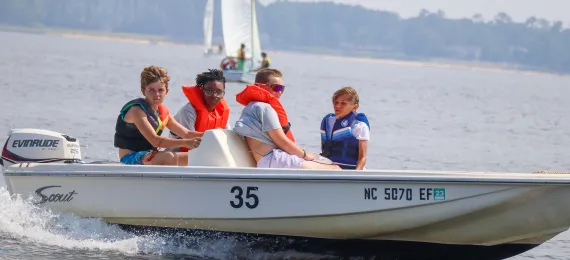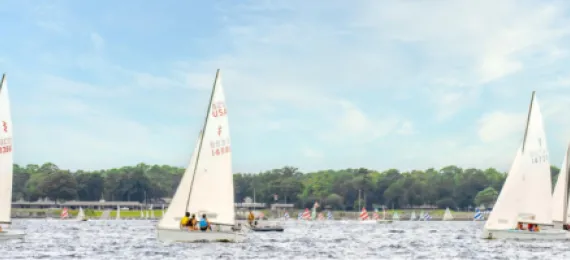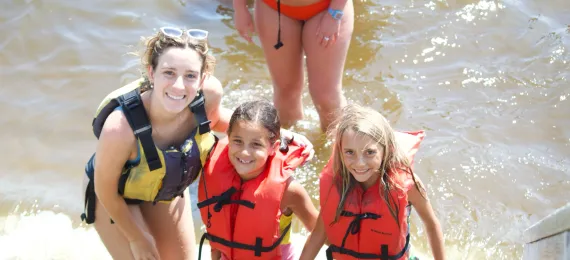Breadcrumb
At Camp Sea Gull and Camp Seafarer, we want campers to leave with resilience, greater independence, and improved problem-solving skills. As parents and caregivers, you can partner with us to help prepare your camper for our overnight camp programs.
Doing Hard Things is Possible
During their time at Camp, campers will encounter situations that are physically, mentally, and emotionally challenging. They will succeed under our careful watch and with the love and support of their families back home.
Tell your children that you know they can do hard things and you believe in them! If they know you believe in them, they will believe in themselves! If there are areas where your child may need additional help, please let us know in their camper forms.
Homesickness is Normal
We all get a little homesick sometimes and Camp is often the first and best lesson in feeling those challenging feelings. Campers learn what to do with those feelings by talking about how they feel with their counselors and learning that hard things are often a learning opportunity. Some campers feel homesick right away and for others it can take a week or two to set in.
Rest assured, we are ready to support our campers and homesickness typically passes within a day or two. Please refrain from telling your child you will come to get them if they are homesick; instead, tell them to ask for help when they need it, that you love them and believe that they can push through challenges like homesickness. Remind them that being homesick is a normal part of growing up.
Disappointment is Real
Know that disappointment is real, and it is coming, even at Camp. We strive to provide an environment that is challenging and provides opportunities for campers to pick themselves up, dust themselves off and keep right on going. Learning to deal with disappointment and discomfort is a crucial life skill.
Our counselors will be there to support your camper to problem solve, break big goals into smaller pieces, and talk through tricky situations. Begin the conversation with your child about how they will handle difficult situations when they arise and who they can go to for help.
Win and Lose
Usually, to truly win, we have to lose first. We teach campers to win and to lose, and to always try again either way. Remind your child that the best kind of player is the one who knows how to win and lose with grace and a good attitude. When good sportsmanship happens everyone wins!
Diversity is a Gift
The world is big and there are lots of people out there; some are like you, and some are not. To be a good citizen of the world, we can recognize our differences and use what we learn to grow in empathy and love for all. Caring for others is consideration in action. Join us in our effort to create a community that celebrates diversity and one where belonging is a main goal.
Practice Unplugging
Camp Sea Gull and Camp Seafarer are environments where campers may not have typical coping tools they use at home (family members, pets, technology, typical routine or their own room). Practicing different strategies and developing new ones is key to learning and growth.
Practice time free of screens and technology leading up to Camp and encourage your camper to problem-solve on their own before coming to you.
Share the Responsibility
We all have responsibilities in our Camp community; campers will always be responsible for their hygiene, their belongings, their space and their choices. Everyone plays an important part in keeping our cabins clean and tidy, our meals running smoothly, and our equipment ready to go.
How can you begin today to set up your camper for success? Give them predictable, reasonable responsibilities at home that they can do independently. Set the expectation that they contribute to your home community by doing their part. Teach them to do things independently and aim to offer fewer and fewer reminders and, as always, let us know where they need help.
Speak Up and Be an Upstander
At Camp, we look for upstanders, as opposed to bystanders. Bystanders are people who see something happen and do not say anything, or see someone who might need help and choose not to speak up.
At Sea Gull and Seafarer, we encourage upstanders: that is if you see something that’s not right, you have a responsibility to say something. This includes if you need something. Advocating for yourself, or for anyone else at Camp, will be taken seriously. Advocating for yourself can be as easy as telling a counselor that you are sad, or that you need help finding something, or want help trying something new.
Consider ways you can begin a dialogue at home about being an upstander and speaking up, both for themselves and others. Practice having your camper advocate for themselves.
Feel free to share these topics with your camper as conversation starters about how to best set them up for a successful summer. We would love to hear how these conversations go and what you learn so that we can implement these learnings in staff training with our counselors and as we build programs.
Please email Meredith Stewart at Camp Seafarer and/or Liz Morgan at Camp Sea Gull.
See you on the Coast!
Please check the American Camp Association article, "3 Important Lessons Kids Learn from Camp"
Recent Articles

2026 Session Offerings

Waitlist Pro Tips


